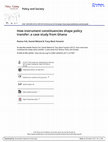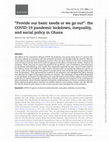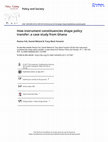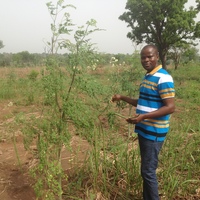Books by Rosina Foli

The concept of instrument constituency provides students of public policy with a new analytical t... more The concept of instrument constituency provides students of public policy with a new analytical tool for the analysis of policy change. In this article, we use the example of cash transfer programs to show how this concept also makes a direct contribution to the analysis of transnational policy transfer. More specifically, the analysis shows how, over the last dozen years, actors forming an instrument constituency promoted the diffusion of cash transfers as a policy instrument from Latin America to sub-Saharan Africa and, more specifically, from Brazil to Ghana. This case study of Ghana’s adoption of a cash transfer program is grounded in semi-structured, expert interviews conducted with both domestic and transnational actors. Overall, the analysis demonstrates how the concept of instrument constituencies can enrich the literature on policy transfer, a key source of policy change in both developed and developing countries.
Books and Book Chapters by Rosina Foli
Papers by Rosina Foli
Permission to Use In presenting this thesis in partial fulfilment of the requirements for a Postg... more Permission to Use In presenting this thesis in partial fulfilment of the requirements for a Postgraduate degree from the University of Saskatchewan, I agree that the Libraries of this University may make it freely available for inspection. I further agree that permission for copying of this thesis in any manner, in whole or in part, for scholarly purposes may be granted by the professor or professors who supervised my thesis work or, in their absence, by the Head of the Department or the Dean of the College in which my thesis work was done. It is understood that any copying or publication or use of this thesis or parts thereof for financial gain shall not be allowed without my written permission. It is also understood that due recognition shall be given to me and to the University of Saskatchewan in any scholarly use which may be made of any material in my thesis.

Policy and Society, 2022
The effects of the coronavirus disease (COVID-19) pandemic cuts across every facet of a nation’s ... more The effects of the coronavirus disease (COVID-19) pandemic cuts across every facet of a nation’s life. The near collapse of economies with the attendant job losses has brought forth the need for effective social policies, particularly in developing countries, that can serve citizens in dire need. Consequently, many of these countries have had to craft emergency social policies to help their citizens. Ghana is no exception. While measures to control the spread of the pandemic, such as lockdowns and restrictions on movement and gathering, were timely, they negatively impacted the poor, most of whom work in the informal sector and depend on daily survival activities such as buying and selling basic goods. As a result, some of the measures were ignored as people feared they would die from hunger rather than from the pandemic. Thus, governmental response to the pandemic was highlighted by policy layering and exposed the fragile social support systems in existence. The challenges of respo...
Routledge Handbook of Public Policy in Africa, 2021
Canadian Journal of African Studies / Revue canadienne des études africaines, 2018
Abstract Beyond economics-centric discourses about issues like “social investment,” in recent yea... more Abstract Beyond economics-centric discourses about issues like “social investment,” in recent years scholars have argued that social programs, like education, healthcare, and income support arrangements, can be instrumental in the construction and reconstruction of national identities and solidarities at both the ideational and the institutional level. Drawing on this scholarship, this article makes a direct contribution to the comparative politics and policy literature by examining the trajectories of nation-building and social policy development in Ghana. It extends existing scholarship by providing an in-depth study of Ghana while using that case to further explore the understudied connection between social citizenship, identity formation, and policy feedbacks from existing social programs.
Permission to Use In presenting this thesis in partial fulfilment of the requirements for a Postg... more Permission to Use In presenting this thesis in partial fulfilment of the requirements for a Postgraduate degree from the University of Saskatchewan, I agree that the Libraries of this University may make it freely available for inspection. I further agree that permission for copying of this thesis in any manner, in whole or in part, for scholarly purposes may be granted by the professor or professors who supervised my thesis work or, in their absence, by the Head of the Department or the Dean of the College in which my thesis work was done. It is understood that any copying or publication or use of this thesis or parts thereof for financial gain shall not be allowed without my written permission. It is also understood that due recognition shall be given to me and to the University of Saskatchewan in any scholarly use which may be made of any material in my thesis.

Review of International Political Economy, 2018
ABSTRACT The purpose of this paper is to improve knowledge of the transnational diffusion of publ... more ABSTRACT The purpose of this paper is to improve knowledge of the transnational diffusion of public policies. It argues that existing studies on the subject do not provide an adequate understanding of the mechanisms through which diffusion takes place, nor do they sufficiently address the roles specific organizations and individuals play in driving or determining the policy transfer process. We address these shortcomings by studying the diffusion of conditional cash transfer (CCT) programmes from Latin America to Ghana and the Philippines over the past decade. We use the concept of ‘instruments constituency’ to delineate and trace the various actors and channels involved in the diffusion of CCTs. The comparative case studies show that these constituencies, dedicated to the articulation, adoption, and expansion of particular policy instruments, are central players in transnational diffusion of policies. This finding has significant implications for the study of policy transfer and diffusion, identifying a heretofore neglected actor in these processes.

Global Social Policy, 2015
Transnational actors (TNAs) are a part of the global social policy process. But questions of thei... more Transnational actors (TNAs) are a part of the global social policy process. But questions of their roles and involvement in the process remain unanswered. Using a qualitative research to study Ghana’s adoption of the Livelihood Empowerment Against Poverty (LEAP), this article brings new evidence to light on how TNAs influence social policies in developing countries. Contrary to arguments that stress imposition as the main policy diffusion mechanism, it is shown here that TNAs combine multiple strategies including ideational, institutional, and material incentives to influence social policies in particular countries. As idea purveyors at the transnational level, TNAs are linked to the national policy process through their connections with policymakers and, more specifically, through policy discussions at regular sector working group meetings. From this perspective, ideas are shared and availability of support toward policy development is communicated.
Journal of Social Policy, 2016

Poverty & Public Policy, 2014
ABSTRACT This study explores how international organizations (IOs) shape ideas about poverty and ... more ABSTRACT This study explores how international organizations (IOs) shape ideas about poverty and anti-poverty policymaking in sub-Saharan Africa (SSA). It argues that, beyond the use of conditionality, IOs significantly influence conceptions of poverty in SSA through various mechanisms, including technical assistance, personnel training, and capacity building, collaborating with civil society organizations, publications, conferences, seminars, and as think tanks. The analysis focuses on the World Bank (WB) and the Organization for Economic Co-operation and Development (OECD), two organizations that have had a long-standing relationship with SSA countries and have made significant contributions to development in the region. However, unlike the WB, whose activities in SSA are well known, the OECD's role in SSA is much less known. Therefore, this study broadens the discussion of the role of IOs in domestic policy development in SSA by incorporating the OECD. At the same time, the study offers a comparative perspective missing from empirical studies about IOs, which tend to focus on only one organization at a time.

Policy and Society
The concept of instrument constituency provides students of public policy with a new analytical t... more The concept of instrument constituency provides students of public policy with a new analytical tool for the analysis of policy change. In this article, we use the example of cash transfer programs to show how this concept also makes a direct contribution to the analysis of transnational policy transfer. More specifically, the analysis shows how, over the last dozen years, actors forming an instrument constituency promoted the diffusion of cash transfers as a policy instrument from Latin America to sub-Saharan Africa and, more specifically, from Brazil to Ghana. This case study of Ghana's adoption of a cash transfer program is grounded in semi-structured, expert interviews conducted with both domestic and transnational actors. Overall, the analysis demonstrates how the concept of instrument constituencies can enrich the literature on policy transfer, a key source of policy change in both developed and developing countries.








Uploads
Books by Rosina Foli
Books and Book Chapters by Rosina Foli
Papers by Rosina Foli